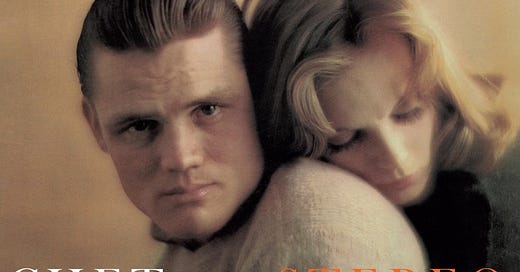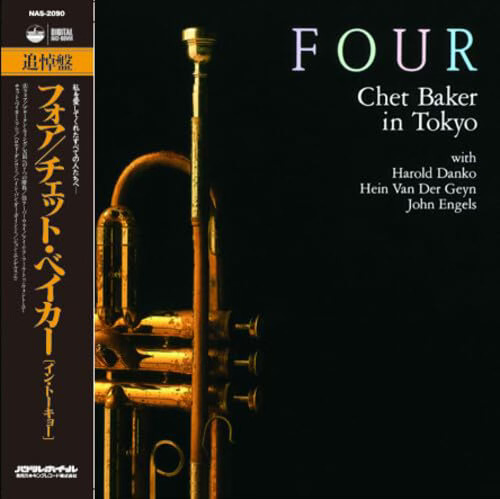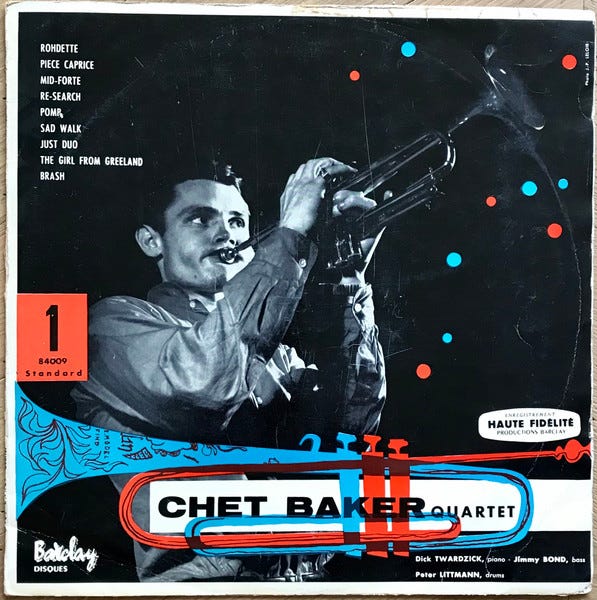Chetflix & Chill and Strata-Various Rising
Getting Started With Chet Baker and Strata-East is Back!
Reply All: Email of the Week
Dear Syd,
You almost never write about Chet Baker on Substack or Instagram. What gives?
Sincerely,
Epstein’s Mother’s Trumpet Teacher
Dear EMTT,
Thanks for reading and writing. You are correct in that, from a sheer numbers standpoint, Chet Baker is underrepresented in the Jazz & Coffee universe. That’s not for any particular stylistic reason, though his extensive catalog is uneven, and I remember feeling overwhelmed as a Chet newbie. The highs are extraordinary, but the clunkers will send anyone with taste screaming from the room. I won’t dwell on those. But here’s some justice for Chet (and EMTT) with my three picks to build a Chet Baker collection. Many more titles are in the library, but if I’m in the mood for Chet, most of the time, I’m reaching for one of these:
Chet Baker Chet (Riverside 1959)
The album cover always makes me think of those K-Tel romance compilations they used to advertise on afternoon television when I was a kid. Looks like Chet and his companion are having a moment in between the long walk on the beach and stretching out on the shag rug in front of the fireplace. Riunite on ice? That’s nice. But all kidding aside, this record may not have much uptempo fire, but it definitely sets the right mood—more than one “Chet” came into the world because of this record. It’s more than just baby-making music, though. It’s the amazing, all-purpose Chet Baker record. Rainy days. Dinner parties. Breakups. Makeups. Other than blaring it at Giants Stadium when the defensive line needs to hold on a critical play, it’s an excellent listen in most other situations. What a lineup:
Chet Baker—trumpet, Pepper Adams—baritone saxophone, Herbie Mann—alto flute, Kenny Burrell—guitar, Bill Evans—piano, Paul Chambers—bass, Connie Kay or Philly Joe Jones—drums
Chet Baker Four: Chet Baker in Tokyo (Recorded June 14, 1987)
I’ve recommended this record to Chet skeptics, and I’m pleased to report that it has changed more than a few minds. This record and its sister album (Memories: Chet Baker in Tokyo—high on my vinyl want list if anybody is selling NAS 2089 Paddle Wheel Records, 2021) were recorded on the same day and are the best of Baker’s latter-day releases. He wails on Miles Davis’s “Four,” refuting the notion that Chet lacked chops. Later on, during “I’m a Fool to Want You,” you’ll be glad CostCo had the extra-large Kleenex in stock last week. I like the slightly gravelly texture in Chet’s older voice, which gives it a world-weary edge that deepens his authenticity. Chet lived a hard life. There were long periods of time he was entirely out of it, or off the grid, in prison, or recovering from having the crap kicked out of him. He’d be dead within a year of this recording. But for a few weeks in Japan, unable to get heroin and forced into methadone treatment, he played with a group he felt connected to—and was in better fighting shape. This is not only one of the greatest Chet Baker records; it’s one of the great all-time live jazz records. Excellent sound, SUPERB performance.
Chet Baker-trumpet/vocal, Harold Danko-piano, Hein van de Geyn-bass, John Engels-drums
Chet Baker Quartet (Barclay 1955)
Pianist Dick Twardzik’s enthusiasm for the compositions of classically trained/jazz-oriented composer (and Twardzik’s teacher/mentor) Bob Zieff must’ve been infectious. Twardzik convinced Baker that for their first recording session in Europe during the fall of ‘55 they should record an album of Zieff’s compositions. Baker lacked the music theory chops of his studio peers—his reading skills remained rudimentary—but he was receptive and took to Zieff’s compositions like a duck to water. Baker and Twardzik operate in a left-brain/right-brain capacity here, with Twardzik giving a masterclass in high-wire piano trapeze intricacy without a net. At the same time, Baker breaks your heart again and again. Bassist Jimmy Bond and drummer Peter Littman lay a compelling groove, but this is the Baker/Twardzik (and Zieff) show. Tragically, Twardzik overdosed a week or so after this session, prematurely ending the promising career of this rising star at age 24. Many labels with variable sound quality and various unrelated bonus tracks have issued this date many times over the years. The 2024 Decca vinyl editions are solid, and the key tracks are the ones crediting compositions by Bob Zieff. I don’t know enough music theory to unpack all that’s happening here, but this isn’t your garden-variety mid-50s trumpet quartet session. It’s not an audiophile delight, but the music gets under your skin and stays there. I love this record.
If you’ve got other Chet Baker recommendations, I’d love to hear them!
Strata-East Rises and Returns, Redux
The creativity of independent jazz began as an irritant to the major label system. Over time, the indie jazz community grew to be a painful thorn in the side of the music business. With the founding of Strata-East in 1971, independent jazz became an effective counterpunch to an industry built to swallow artists whole. Their ethos created necessary tension in a business that thrived on control over the means of production, distribution, and finance:
The artist is in control. The artist owns the work. The artist gets paid.
Founders Charles Tolliver and Stanley Cowell weren’t naive. They knew that this ethos alone wasn’t sufficient to change an industry rife with institutional racism and greed. But the success of Strata-East proved that the music could go much further WITH that ethos. Beyond the beyond. Take a full trek through the new compilation Strata-East: The Legacy Begins that just dropped this past Friday, and you’ll hear what I mean.
No One Owns a “Strata-East Sound”
For years, I’ve been guilty of writing in various reviews that a record has a “Strata-East sound,” and it’s time to scrub that nonsense from my vocabulary. There is no one Strata-East sound.
The label covered deep spiritual jazz, edgy post-bop, meditative solo piano, avant-garde experiments, layered vocal flights, and raw funk-fusion explorations—sometimes blending several on the same record. The only real throughline was freedom, and The Legacy Begins gets that across beautifully. This isn’t just a “best-of” collection or a sampler—it’s a reintroduction, a reminder that Black artistic independence shaped the sound of jazz in ways the industry never fully acknowledged.
Reissue Campaigns Take a Village
Let’s talk vinyl and access—because getting your hands on most Strata-East records has been a minor miracle for decades.
Some of these titles are rare, commanding triple-digit price tags on the secondary market. Others have been poorly reissued, sourced from dubious masters, or bootlegged with all the warmth and quality of a Celeste Pizza For One frozen dinner. Now, with AAA mastering by Kevin Gray, audiophile-quality pressings at RTI, a partnership with Mack Avenue Music Group, and a team of writers, audio consultants, and PR, jazz enthusiasts are finally getting these records back the right way.
And for those of you who’ve been living with the same 128kbps MP3s you nicked from Napster back in the day, “import” CDs from that guy in Washington Square Park or make do with YouTube—rejoice! The Legacy Begins marks the first time much of this music is available digitally. No more low-bitrate bootlegs. No more pixelated Discogs listings of expensive vinyl in browser windows, which you minimize so quickly that your significant other thinks they caught you looking at porn. Which, I suppose, may not be too far from the truth.
This Strata-East is real. And it’s spectacular.
A couple of weeks back, I had the pleasure of joining colleagues
, , and , for a discussion about the relaunch of Strata-East. was also scheduled to join but had to bow out due to a death in the family. Nate was kind enough to lead the conversation and has made the video available to his paid subscribers, and I’m doing so as well.<video at the end of this post>Vinyl enthusiasts should mark two dates on their calendars:
April 12 (Record Store Day) brings Pharoah Sanders’ Izipho Zam (My Gifts) (with new liner notes by
)April 25 is the street date for three additional titles to complete the first batch of physical reissues:
Charles Tolliver’s Music Inc. Live at Slugs’ Volumes 1 & 2 double LP (with new liner notes by
)Stanley Cowell’s Musa: Ancestral Streams (with new liner notes by
)Charles Rouse’s Two Is One (with my new liner notes!)
Vinyl enthusiasts will appreciate all the trimmings from Kevin Gray, RTI, tip-on jackets, and an overall quality of attention that speaks volumes. Michael Fremer goes deep into the vinyl story at Tracking Angle. All three releases will also be available on streaming platforms and CD, and the Music Inc. digital release will contain bonus tracks.
Strata-East isn’t just making a comeback—it’s being called back into active duty at precisely the right time. As the music industry gets more exploitative and top-heavy, we need reminders that artists can own their work, control their futures, and create without compromise. This label was founded on resistance, refusing to play by industry rules, and carving out a space where artistry came first. It was radical in the ‘70s. It’s still radical today.
And to be blunt, I think Clifford Jordan’s Glass Bead Games should be in every jazz library. If I’m ever elected President, my second executive order will be issuing a copy to every household worldwide.
Here’s the video of the Strata-East discussion—big thanks to Nate for hosting and all my colleagues for participating!








